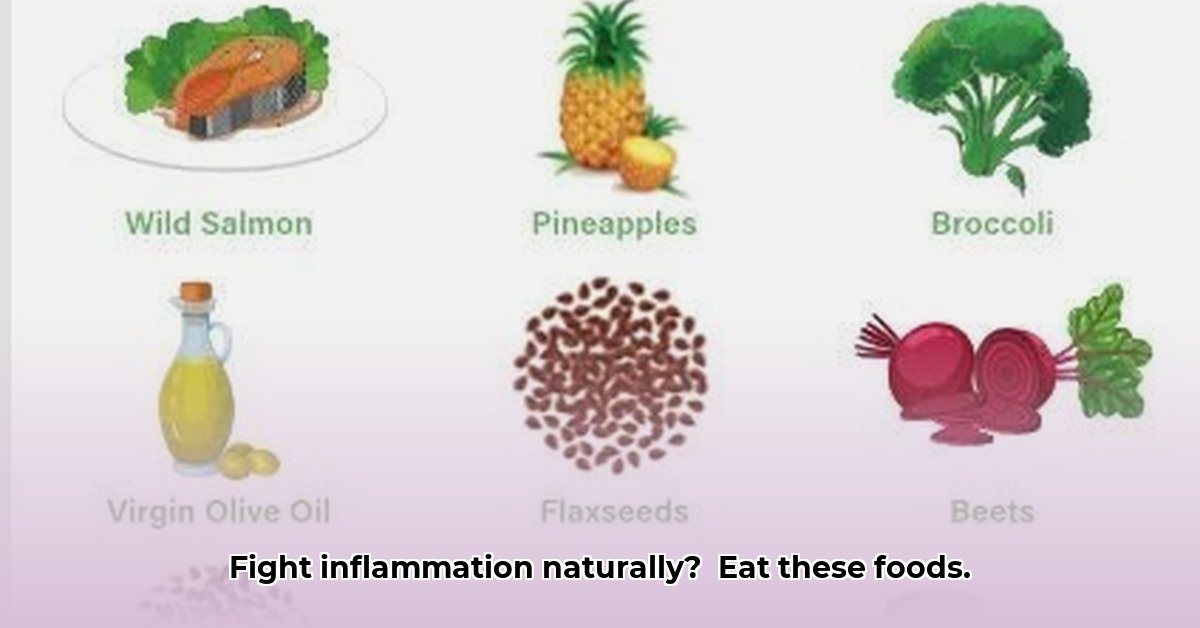Inflammation: it’s your body’s way of saying “ouch!” A little inflammation is normal, like when you scrape your knee. But chronic inflammation—the kind that simmers under the surface—is a different beast. It can contribute to all sorts of problems, from heart trouble and diabetes to joint pain and even some cancers. The great news is, you have a powerful tool to fight back: your diet! This guide will break down how food affects inflammation, show you the best anti-inflammatory foods, and give you a simple plan to build healthier eating habits. We’ll cover everything from the science behind it all to easy, tasty recipes. Let’s learn how to eat your way to a healthier, less inflamed you.
Anti-Inflammatory Foods: Fueling Your Body’s Natural Healing Power & Reducing Joint Pain
Inflammation – it’s a word we hear a lot, but what does it really mean? Think of it as your body’s emergency response team. When you get a cut or fight off a cold, inflammation kicks in to help heal and protect. That’s acute inflammation, and it’s perfectly normal and necessary. But chronic inflammation? That’s the silent simmering fire that contributes to a whole range of health problems over time. It’s like a low-grade burn that keeps your body in a state of constant alert, potentially increasing the risk of diseases like heart disease, arthritis, and even some cancers. The good news? We can influence inflammation through our diet. Let’s dive into how anti-inflammatory foods can help with chronic pain and overall health.
The Gut-Inflammation Connection: A Two-Way Street
The gut microbiome, the trillions of bacteria, fungi, and other microorganisms living in your digestive tract, profoundly impacts inflammation. An unhealthy gut, often called “leaky gut” or increased intestinal permeability, allows substances to escape into the bloodstream, triggering an immune response and inflammation. Conversely, chronic inflammation can disrupt the delicate balance of the gut microbiome, leading to further imbalances and perpetuating the cycle.
Powerhouse Foods: Your Body’s Natural Defense Squad Against Oxidative Stress
Many foods contain compounds that can help your body manage inflammation. These aren’t miracle cures, but they can be part of a powerful strategy for better health. Think of them as adding extra support to your body’s natural healing capabilities, offering antioxidant effects and managing oxidative stress.
Berries: Tiny Packages of Potent Protection: Berries, like blueberries, strawberries, raspberries, and blackberries, are packed with antioxidants called anthocyanins, which give them their vibrant colors. Anthocyanins combat inflammation and may reduce the risk of chronic diseases.
Fatty Fish: Omega-3 Richness for Reduced Inflammation: Fatty fish such as salmon, mackerel, tuna, sardines, and herring are excellent sources of omega-3 fatty acids, particularly EPA (eicosapentaenoic acid) and DHA (docosahexaenoic acid). These essential fats have potent anti-inflammatory effects, helping to regulate the body’s inflammatory response.
Cruciferous Vegetables: Broccoli and Friends for Detoxification: Broccoli, cauliflower, Brussels sprouts, and kale are cruciferous vegetables packed with antioxidants and phytochemicals, including sulforaphane. Sulforaphane has been shown to reduce inflammation by neutralizing free radicals and supporting detoxification pathways.
Avocados: Healthy Fats and More: Avocados are rich in monounsaturated fats, fiber, and various vitamins and minerals. These healthy fats have anti-inflammatory properties, contributing to heart health and overall well-being.
Green Tea: A Beverage of Benefits: Green tea is rich in antioxidants, particularly epigallocatechin gallate (EGCG), which has potent anti-inflammatory effects. Regularly drinking green tea may help reduce inflammation and protect against chronic diseases.
Turmeric: The Golden Spice with Curcumin: Turmeric contains curcumin, a compound with powerful anti-inflammatory and antioxidant properties. Curcumin can help reduce pain and inflammation associated with arthritis and other inflammatory conditions.
Extra Virgin Olive Oil: A Mediterranean Staple: Extra virgin olive oil is rich in monounsaturated fats and antioxidants, particularly oleocanthal. Oleocanthal has similar anti-inflammatory effects to non-steroidal anti-inflammatory drugs (NSAIDs).
Nuts and Seeds: Healthy Snacks with Anti-Inflammatory Benefits: Almonds, walnuts, chia seeds, and flaxseeds are excellent sources of healthy fats, fiber, and antioxidants. Regularly consuming nuts and seeds may help reduce inflammation and support heart health.
Dietary Strategies: Building Your Anti-Inflammatory Blueprint and Healthy Eating Habits
Instead of focusing on individual foods, consider adopting a balanced, whole-foods eating pattern that inherently incorporates anti-inflammatory powerhouses. Two particularly effective approaches are:
-
The Mediterranean Diet: This eating style emphasizes fruits, vegetables, whole grains, legumes, nuts, and olive oil. It’s naturally rich in anti-inflammatory compounds and has consistently been linked to better heart health and reduced risk of chronic diseases. The emphasis on plant-based foods likely contributes to its powerful anti-inflammatory effect.
-
The DASH Diet (Dietary Approaches to Stop Hypertension): While originally designed to lower blood pressure, the DASH diet’s emphasis on fruits, vegetables, whole grains, and lean protein, while limiting sodium and unhealthy fats, also has anti-inflammatory benefits. This is probably due to the abundance of nutrient-rich foods included.
Remember, these are guidelines, not strict rules. You can adapt them to fit your preferences and dietary needs. Consulting a registered dietitian can help you personalize these plans.
Foods to Limit: Addressing Potential Inflammation Triggers in Managing Autoimmune Diseases
While some foods combat inflammation, others can potentially worsen it. While not always perfectly clear-cut, limiting these can be beneficial in managing autoimmune diseases:
-
Processed Foods: These are often packed with unhealthy fats, high levels of sodium, and additives that some research suggests may increase inflammation.
-
Refined Carbohydrates: White bread, sugary cereals, and pastries are rapidly digested, leading to blood sugar spikes, which might trigger inflammatory responses in some individuals.
-
Added Sugars: Excessive sugar consumption is linked to increased inflammation in several studies. Experts are actively researching the precise mechanisms, but limiting added sugar is generally considered a good strategy for overall health.
-
Excessive Alcohol: While moderate alcohol consumption may have some health benefits for certain individuals, excessive alcohol intake can contribute to inflammation and liver damage.
Reducing your intake of these foods may contribute to a reduction in inflammation; however, the extent varies between individuals and requires further research to completely understand.
Crafting Your Personalized Anti-Inflammatory Plan: A Step-by-Step Guide
Remember, changing your eating habits is a process, not a race. Take these steps to build your personalized plan:
Step 1: Take Stock: Honestly assess your current eating habits. What are your strengths and weaknesses? Identify areas where you can make improvements. Keeping a food journal for a week can provide valuable insights.
Step 2: Start Small: Don’t try to overhaul your diet overnight. Gradually incorporate more anti-inflammatory foods into your meals each week. Small, sustainable changes are more effective in the long run.
Step 3: Prioritize Whole, Unprocessed Foods: Make fruits, vegetables, lean proteins (fish, poultry, beans), and whole grains the foundation of your diet. These foods are naturally rich in nutrients that support your body’s natural healing processes.
Step 4: Listen To Your Body: Pay attention to how different foods make you feel. This self-awareness can help you identify potential triggers and make informed choices.
Step 5: Seek Expert Guidance: A registered dietitian or your healthcare provider can provide personalized advice and help you create a plan that’s safe and effective for your individual needs and health conditions.
The Bottom Line: Taking Control of Your Health and Boosting Immune Function
Chronic inflammation is a serious concern, but it’s not something you’re powerless against. By incorporating anti-inflammatory foods into a balanced diet and embracing a mindful approach to eating, you can empower your body to manage inflammation more effectively, promoting better overall health and well-being, along with boosting immune function. Remember, this is an area of ongoing research, and our understanding continues to evolve. Stay informed and consult with healthcare professionals for personalized guidance.
How to Customize an Anti-Inflammatory Diet Plan for Specific Health Conditions and Reduce Disease Risk
Key Takeaways:
- Many anti-inflammatory diet plans exist, all emphasizing whole foods.
- Core principles include boosting fruits, vegetables, healthy fats, and whole grains.
- Reducing processed foods, sugar, and unhealthy fats is essential.
- Plans vary in calorie counts, macronutrient ratios, and recipes.
- How to customize an anti-inflammatory diet plan for specific health conditions requires individual needs and preferences.
- Consult a healthcare professional for personalized guidance and reduce disease risk.
Understanding Inflammation: The Good, the Bad, and the Ugly for Cardiovascular Health
Inflammation is your body’s natural response to injury or infection. Acute inflammation, like a swollen ankle after a sprain, is short-lived and beneficial. Chronic, low-grade inflammation, however, is a different story. It silently simmers, linked to heart disease, arthritis, and even some cancers. This is where diet plays a crucial role in maintaining cardiovascular health.
Anti-Inflammatory Powerhouses: Your Food Arsenal for Preventing Cell Damage
Certain foods are known for their anti-inflammatory properties. Think of them as your body’s tiny firefighters, putting out those inflammatory embers and preventing cell damage.
- **Omega
- Why Am I Always Thinking About Food? Your Body and Brain Explain - February 2, 2026
- Healthy Eating Is About Quality, Not Just Calories - February 1, 2026
- Healthy Living Products to Elevate Your Wellness Routine - January 31, 2026










